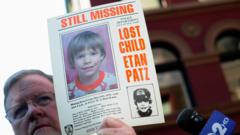The court acknowledged that during Hernandez's trial, jurors received misleading guidance regarding the weight of confessions he provided following prolonged questioning, raising concerns about the integrity of the judicial process. Hernandez's attorney has urged for a renewed focus on uncovering the real circumstances behind Patz's disappearance.
Hernandez's journey through the legal system has been complicated and contentious. Convicted in a case that rattled a city and reshaped the conversation around missing children, Hernandez's circumstances present an array of challenges to the prevailing narrative.
The disappearance of Etan Patz, which occurred on his way to a school bus stop, became a rallying point for child safety advocates and a grim reminder of the urgent need for justice in unresolved cases. The National Missing Children's Campaign leveraged Patz's image, significantly impacting public awareness.
Following Hernandez's interrogation and controversial confessions, the earlier trial resulted in a hung jury in 2015, leading to his eventual conviction two years later. Notably, the appeals court emphasized Hernandez's mental health history and cognitive abilities in its decision, indicating the need for judicious legal consideration in criminal cases.
As discussions about this case unfold, it becomes increasingly evident that the complexities surrounding the disappearance of Etan Patz and the subsequent legal battles underscore deeper societal questions about trial fairness, mental health, and the responsibility of law enforcement. The Manhattan District Attorney's office is currently reviewing the appeal decision, signaling that this high-profile case is far from over.
Efforts to shed light on this long-standing mystery have garnered national interest, and Hernandez's legal fate will undoubtedly continue to draw attention as it intersects with broader themes of justice and accountability in America's criminal justice system.
Hernandez's journey through the legal system has been complicated and contentious. Convicted in a case that rattled a city and reshaped the conversation around missing children, Hernandez's circumstances present an array of challenges to the prevailing narrative.
The disappearance of Etan Patz, which occurred on his way to a school bus stop, became a rallying point for child safety advocates and a grim reminder of the urgent need for justice in unresolved cases. The National Missing Children's Campaign leveraged Patz's image, significantly impacting public awareness.
Following Hernandez's interrogation and controversial confessions, the earlier trial resulted in a hung jury in 2015, leading to his eventual conviction two years later. Notably, the appeals court emphasized Hernandez's mental health history and cognitive abilities in its decision, indicating the need for judicious legal consideration in criminal cases.
As discussions about this case unfold, it becomes increasingly evident that the complexities surrounding the disappearance of Etan Patz and the subsequent legal battles underscore deeper societal questions about trial fairness, mental health, and the responsibility of law enforcement. The Manhattan District Attorney's office is currently reviewing the appeal decision, signaling that this high-profile case is far from over.
Efforts to shed light on this long-standing mystery have garnered national interest, and Hernandez's legal fate will undoubtedly continue to draw attention as it intersects with broader themes of justice and accountability in America's criminal justice system.



















